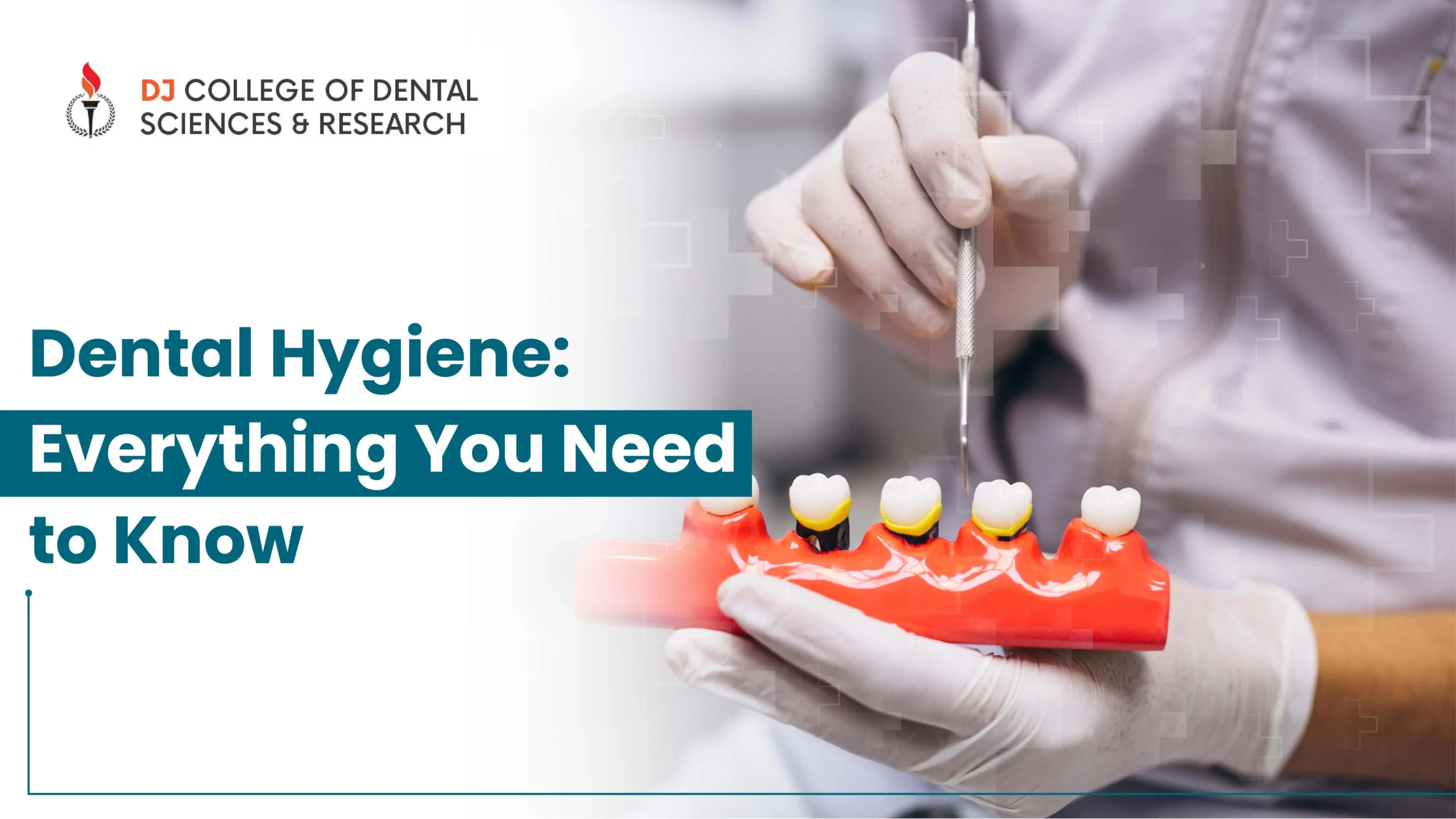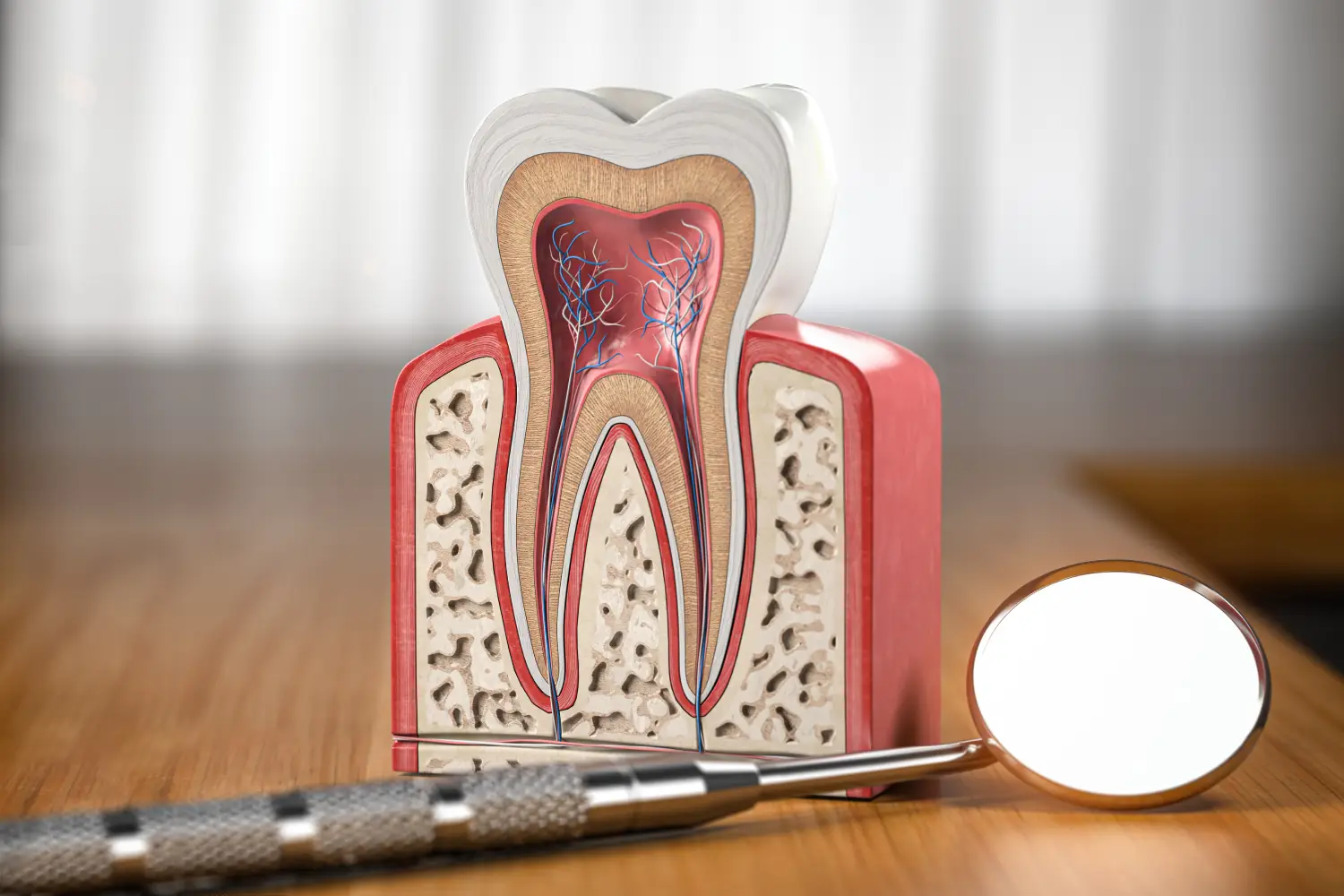“Dental hygiene” is one of the talk-of-the-town topics today globally after the data released by the World Health Organisation. As per the World Health Organisation, around 3.5 billion people are affected by oral diseases as of March 2023. This data has created a panic and instigated dental hygiene awareness among people.
To take a stand in creating awareness of dental hygiene, DJ College of Dental Sciences & Research provides this article on dental hygiene with complete guidance. Read more to know more.
Table of Contents
ToggleA Comprehensive Guide on Dental Hygiene:
Do you know that as per the World Health Organisation, an estimated 2 billion people suffer from caries of permanent teeth and 514 million children suffer from caries of primary teeth? This poor dental hygiene condition in the global population is due to a lack of awareness.
Let us explore more about dental hygiene and dental hygiene steps.
Signs of Poor Dental Hygiene:
Poor oral hygiene showcases various warning signs for people, yet ignorance of it leads to severe dental issues. Some of the prominent signs of poor dental hygiene are as follows:
- Bleeding gums
- Chronic bad breath
- Tooth decay
- Gum recession
- Loose teeth
- Frequent mouth sores
- Toothache
- Swollen gums
- Gingivostomatitis
These are the notable signs of poor oral hygiene routine and take a look at the dental health survey graph among a global population.
Source: Science Direct
Also Read- Find Out Some Crucial Information About Dental Hygiene
Dental Hygiene Steps:
The importance of oral hygiene in daily life is slowly gaining momentum in today’s world due to increasing global dental awareness campaigns. Here are some essential dental hygiene steps that will help in maintaining better oral hygiene.
Brush Properly:
It is very important to brush properly to maintain dental hygiene. Brushing properly refers to the following steps:
- Brush your front teeth, i.e., incisors.
- Brush your side teeth which include canines, premolars and molars.
- Brush both on upper and lower teeth
Brush Twice a Day:
Second, most advice from dental experts on oral hygiene routine is to brush your teeth twice a day.
Always brush your teeth once you wake up in the morning and always at night before going to bed. Doing so will help to eradicate vital infection-causing germs. This not just helps in maintaining dental hygiene, but also ensures overall health.
Use Fluoride Toothpaste:
The use of fluoride toothpaste is one of the most recommended dental hygiene practices as it is supported by the American Dental Association.
When the bacteria in the mouth combine with sugar, it causes demineralisation of the teeth by creating acids which leads to easy prey for dental caries. However the use of fluoride toothpaste aids in remineralization by bringing in calcium and phosphate to develop a new protective layer on teeth that is acid-resistant.
Floss your teeth:
This is one of the pivotal dental hygiene steps, yet most people fail to follow.
While brushing your teeth, the toothbrush can rub off only particles and gems on the outer edges of the teeth and it fails to cleanse deeply between teeth. To overcome this, floss will help.
Flossing teeth is running a piece 18 cm long or so between two teeth in a C-shape to remove the inter-collected dirt particles.
Rub off Your Tongue:
Your tongue is the soft-sponge-like bed where the bacteria settles. So it is very important to rub off your tongue for better dental hygiene.
Use a tongue-scraper or tongue-cleaner to rub off and remove the germ settlements at least once a day to maintain proper oral hygiene.
Use Antibacterial Mouthwash:
Antibacterial mouthwash is one of the best dental hygiene choices to wash off harmful bacteria that can decay the teeth.
In addition to eliminating bacteria, antibacterial mouthwash also removes food, debris and plaque thus protecting the teeth in the best possible way. Choose alcohol-free antibacterial mouthwash to prevent dry mouth.
Regularly Visit Dental Hygienist:
The final advice in the list of dental hygiene steps is to regularly visit a dental hygienist.
A dental hygienist is a trained dental professional who examines the hygiene condition of your teeth and offers the best advice and dental hygiene products.
Visit your dental hygienist at least 6 months once owing to the importance of oral hygiene in daily life.
With this, the comprehensive guide to dental hygiene ends and it is your call to implement our dental hygiene steps for your dental health.
Now, let us explore the career of a dental hygienist if you are intrigued by the occupation.
Career pathway of dental hygienist:
As mentioned above, dental hygienists are dental care professionals concerned with the proper maintenance of the patient’s dental hygiene.
Students can become dental hygienists by completing dental hygiene programs such as Diploma in Dental Hygienist offered in many top dental colleges in India.
The basic eligibility criteria to pursue a diploma in dental hygienist is to complete 10+2 or equivalent at any recognised educational institution with at least 50% aggregate marks.
This diploma in dental hygienist course is a 2-year course that inculcates deeper knowledge of dental hygiene standards, techniques and much more. Pursuing this course will help you become a dental hygienist in the healthcare industry where dental hygiene salary is around INR 5 LPA to INR 7 LPA.
Take a look at the salary graph of a dental hygienist.
Source: Self-created
Many top healthcare establishments hire dental hygienists and some of the prominent ones are as follows:
- Apollo hospitals
- Fortis Healthcare
- Malar hospitals
- Dentsply India
- Max Healthcare
In the current decade, the dental hygienist job role has a great scope due to the increasing dental hygiene awareness among the global population.
Conclusion:
Dental hygiene is one of the primary facets of the overall healthcare profile and so it is pivotal to pay attention to oral hygiene practices. Maintaining proper dental hygiene prevents almost 50% of healthcare issues as the mouth is an easy access point for external germs into the body. Spend a better time each day for dental hygiene and have a healthy life.
FAQs:
- What are 3 good oral hygiene tips?
- Brushing teeth twice a day
- Flossing teeth once a day
- Rubbing off the tongue regularly
- What are important things to know about dental hygiene?
- Appropriate method to brush the teeth
- Importance of flossing teeth for better dental hygiene
- Using antibacterial mouthwash for better oral hygiene results
- What is the most common oral hygiene problem?
The most common oral hygiene problem is dental caries. According to the World Health Organisation, around 2 billion people have permanent dental caries.
- What is the best dental routine?
- Brush your teeth first in the morning and last at night.
- Floss your teeth every morning and rub off your tongue.
- Rinse your mouth twice a day with antibacterial mouthwash.
- Visit a dental hygienist every six months once.







